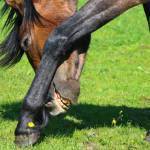Developing Vaccine for Insect Bite Hypersensitivity a Work in Progress

Horses suffering from insect bite hypersensitivity (IBH) present with profound itchiness and subsequent sores from scratching and rubbing. While this allergic condition occurs relatively infrequently–less than 10% of horses worldwide are affected–it is one of the most common allergic conditions of horses, causing quality of life issues.
“No specific therapies are currently available for treating IBH in horses. Some signs can be controlled with corticosteroids, but these medications can have undesirable side effects. Instead, diet can play a key role in promoting a healthy coat and strong skin barrier. For example, some horses derive benefit from long-chain omega-3 fatty acids due to their anti-inflammatory and immunomodulation properties,” explained Catherine Whitehouse, M.S., of Kentucky Equine Research.
Even with a high-quality marine-derived omega-3 fatty acid supplement, such as EO-3, more targeted treatments for IBH are still warranted. Previously, a “vaccine” for IBH using the anti-inflammatory cytokine interleukin-5 was studied. It appeared promising, yet a commercially available product has yet to become available.
Another way to “vaccinate” horses against IBH is by using a technique called allergen immunotherapy (AIT).
“Similar to allergy shots in humans, small amounts of the causative allergens are injected into the patient with this technique. The goal is to restore immune tolerance, correcting the immune system’s imbalance, to decrease clinical signs of this allergic disease,” explained Whitehouse.
Prior research has used “whole-body extracts” of Culicoides spp. (i.e., the entire insect is ground up to create the allergen used for the allergy shots). As one might expect, this whole-body extract contains not only the allergens causing IBH but also nonallergen components that can potentially dilute the allergens. Further, batch-to-batch consistency when making whole-body extracts can be challenging.
Recently, specific allergens causing IBH have been identified, which are referred to as r-Culicoides allergens. The goal is to inject these r allergens into horses with IBH in an AIT protocol instead of a whole-body extract.
This theory was studied in 12 healthy Icelandic horses free from IBH. Horses were treated on weeks 0, 4, and 8 of the study using r allergens created in a laboratory. These treatments were well tolerated, and no adverse effects were noted. The research team evaluated various vaccine protocols and found that subcutaneous injections were equally effective as the more tedious intralymphatic injection route.*
“Further research regarding vaccine preparation and efficacy are required, but this AIT technique appears to hold promise for additional research to finally treat this frustrating clinical condition,” summarized Whitehouse.
*Stefansdottir, S.B., S. Jonsdottir, H. Kristjansdottir, V. Svansson, E. Marti, and S. Torsteinsdottir. 2022. Establishment of a protocol for preventive vaccination against equine insect bite hypersensitivity. Veterinary Immunology and Immunopathology 253:110502.








